Fullmetal Alchemist: Brotherhood is considered by many to be an “entry-level” anime. It certainly was for me. The first one I’ve seen in its entirety. Not that I’m a huge anime lover even now. Regardless, there’s several themes that run throughout the story: the importance of moving forward and not giving up, that some things just can’t be undone, and that everything and everyone is connected. What I’d like to talk about here is forgiveness and breaking the cycle of violence, something Hiromu Arakawa spent much of the original manga on… and how the latter does not necessitate the former.
Much of the discussion of forgiveness and moving on in the story comes from the Ishvalan Civil War. Which most people refer to as the Ishvalan War of Extermination, or simply Ishvalan Genocide. It deserves the latter two names more, as the nation of Amestris sought to wipe out the population of its region, Ishval, entirely. All as part of the plan by the story’s overarching villain.
The Victim and the Murderer
One of the survivors of the massacre is Scar, an Ishvalan who forsook his own name to seek revenge on those who had all but destroyed his people. His targets are State Alchemists, who had been used by the Amestrian government as living weapons, wiping out Ishvalans by the dozens and hundreds with weaponized alchemy. More than that, Scar believes that alchemy is a crime against God, infringing on the right to create that belongs only to Him. It’s a belief borne out of the Ishvalan religion, though Scar’s rage against his people’s fate certainly doesn’t help.
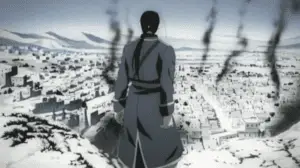
It’s hard to deny that Scar has good reasons to be angry and vengeful, but early on we see him move beyond the bounds of his vengeance. He targets Ed, who’s a State Alchemist but certainly didn’t participate in the extermination of Ishval – something his age should tell Scar quite clearly. We also see him kill Shou Tucker, who likewise isn’t a soldier… though, to be fair, he’s a complete monster in his own right.
After Scar’s unsuccessful attempts to kill Edward, we see him speak to one of the last surviving priests of Ishval. The old man cautions him not to give into revenge and abandon his quest. When Scar asks, incredulous, if that means they should just forgive Amestrians for what they’d done, the priest denies it. It’s not about forgiveness, as there can be none for senseless murder. It’s about a refusal to retaliate and continue the cycle of violence.
His words fall on deaf ears as Scar continues his murder spree. Eventually, however, he meets someone who reverses the roles: Winry Rockbell, whose parents he’d murdered.
As we learn, the Rockbells were helping the injured in Ishval, whether they be Ishvalans or Amestrians. Scar wound up in their hospital after an encounter with Soft J. Kimblee, a State Alchemist who used a Philosopher’s Stone to reduce what was left of Ishval to rubble. Scar’s brother had sacrificed himself to save him, and the nameless Ishvalan woke up in the field hospital. Seeing his brother’s alchemical tattoos on his arms, and the blue Amestrian eyes all around him, he flew into a confused, vengeful rage and murdered the doctors before staggering out, just to see the smoking ruins of his homeland.
Scar’s first meeting with his victims’ daughter occurs during his second fight with the Elric brothers. Winry happens to enter the scene just as Edward accuses Scar of killing her parents. That’s one of those random, but extremely crucial coincidences that drive the plot of the series quite a few times. Winry breaks down and points a gun at Scar after hearing this revelation.
The Ishvalan coldly tells her that she can take the shot, but at that point she’ll be his enemy. Ed, however, gets between Winry and Scar – not just to protect her, but also to prevent her from becoming a killer. This very unpleasantly reminds scar of when he and his family stood before Kimblee, as he prepared to kill them… and his brother jumped in front of him.
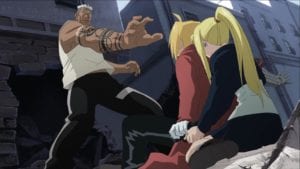
Scar gets away that time, but he meets Winry again, after Ed and Al had captured him. Winry looks him in the eye and asks why he’d killed her mother and father. Scar makes no excuses for what he’d done and admits that Winry has every right to judge him. But Winry, instead, starts bandaging his wounds. When Scar asks her if that means she forgave him, she angrily responds she can’t and won’t – but she won’t take revenge, either. She’s helping him because that’s what her parents would have done.
When someone he had unquestionably wronged tells him she can’t forgive his “senseless murder”, Scar remembers his teacher, who had used the same words to describe the Amestrian genocide. This parallel, placing him in the same place as his people’s butchers, prompts a change in him.
A New Response
From there on, Scar gradually joins the efforts of the heroes, first out of necessity and then in earnest… though for obvious reasons, they’re never exactly friendly. When someone remarks on how he’s working to save the country that had done him so much wrong, though, he disagrees. He’s not fighting to save Amestris, but to change it. Make it accountable for what it did and make sure it never happens again. And unlike his quest for revenge, his fellow Ishvalans support him in that – their help becomes crucial in the final battle.
This is a rather important logical conclusion to the question of forgiveness and revenge. It would be easy to assume that breaking the cycle of revenge means doing nothing. But here, at least, the alternative is to seek justice and reparation, while making sure more such tragedies don’t occur. After all, what happened in Ishval was just a prelude to a much greater atrocity.
Scar does still fight and kills the homunculus Wrath, who had signed the order to exterminate Ishvalans. But he doesn’t do it for vengeance, and focuses on finishing the counter-transmutation circle once he disables Wrath, rather than revel in his revenge. Maybe that makes all the difference.
We get another look at the Ishvalan question from Major Miles, a man who’s part-Ishvalan from his grandfather. He looks Ishvalan, however, and his ancestry was enough for him to fall under the military order to disband all Ishvalan officers – which mirrors many racist policies from the real world. He hopes that by serving in the military, he can change it from the inside, like a small rock causing ripples, and change the Amestrian view of the Ishvalan people.
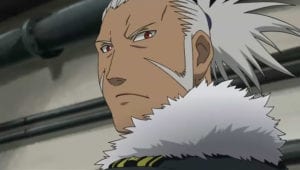
This honestly strikes me as a bit questionable. After all, it’s not like Ishvalans have anything to prove. They weren’t the aggressors in the civil war. “Changing the system form the inside” may come across as a bit of a platutide. Still, seeing Miles and the different way he goes about reacting to the Amestrian racism towards Ishvalans is part of what inspires Scar to change his own attitude.
Just Obeying Orders?
The question of revenge also comes up in the characters arcs of Roy Mustang and Riza Hawkeye. Both of them fought in the Ishvalan Civil War – Roy as an alchemist, Riza as a sniper. Roy is the only alchemist to hold the secret of transmuting fire, earning him the codename of Flame Alchemist… and countless torched Ishvalans on his conscience.
Roy’s goal is to become führer himself, and transform Amestris into a democratic, lawful country, rather than a militaristic state constantly picking fights with its neighbors and murdering its own people. This includes, of course, making reparations for the Ishvalan genocide. When telling Edward about it, Riza makes it absolutely clear, however, that in a properly-functioning country, both she and Roy would be tried as war criminals. They’re willing to let it happen. When Ed points out that they were simply following orders, she states that it’s no excuse.
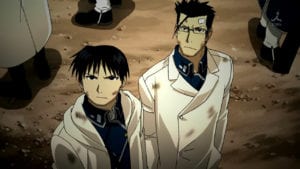
Thus we can see the question of responsibility and forgiveness from another angle. The people who committed the Ishvalan genocide refuse to even consider forgiveness for themselves. Instead, they choose to hold themselves accountable. Unfortunately… we don’t see it come to fruition. The ending of the series has both Roy and Riza swear to restore Ishval. It’s a very optimistic one in the manga, and becomes positively saccharine in the anime.
Apparently, Hiromu Arakawa revealed that they did stand trial for their war crimes eventually, but received pardon for, well, saving the whole country. I suppose that’s fair, but I do wish we’d seen that.
Intent matters
Setting aside the Ishvalan situation, Roy comes to grips with vengeance on a much more personal scale. When he finally meets the homunculus Envy and discovers that they’d killed his best friend, Maes Hughes, he goes berserk. Even though everyone refers to Envy with male pronouns, the author stated that their gender is unclear, so I’ll go with that. His flame alchemy makes him a more deadly foe to the homunculi than anyone else on the main cast (particularly poor Riza, whose guns are like toys to them). Thus, he burns Envy over and over… and over again. Deliberately prolonging the torture and toying with the homunculus.
Eventually, Envy’s regenerative powers are exhausted and they’re reduced to a pathetic worm-like creature, even more powerless to stop Roy than before. As the Flame Alchemist prepares to kill them, though, Riza intervenes, saying she won’t let him do it. Scar and Edward also arrive on the scene, with the same intent. It’s not that they think Envy doesn’t deserve to die – they do plan to kill them for all the crimes they’ve committed. But Mustang’s drunk on revenge and hatred, and his allies believe killing Envy in such a state would be disastrous.
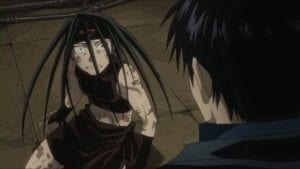
This might seem like an arbitrary distinction, but that’s not how the characters treat it. Riza, Ed and Scar all believe that if Roy kills Envy in vengeful fury, it’ll be a step too far from him. The intent is given tremendous weight. Scar states that while he can hardly reproach anyone for losing himself to vengeance, he pities a country ruled by someone like that. In the end, Envy takes their own life, which Roy calls a coward’s way out.
Many other works would have treated everything inflicted on a monster like Envy to be fair game, but not Fullmetal Alchemist. Here, intent matters and there’s a line after which vengeance becomes too much. But it’s also very clear that the answer and the moral high ground don’t lie in sparing Envy. It’s just that killing them for revenge would be a step too far.
It’s not easy to abandon revenge, or have someone else deal with the person who’d done you such wrong. But not taking the easy way out is a recurring theme in the story. The Elric brothers refuse to restore their bodies with a philosopher’s stone. Human transmutation always backfires, and some things just can’t be undone. Alchemy isn’t the solution to everything. And sometimes, you have to step back and refuse to retaliate, even if you can never forgive.
Images courtesy of Toonami

